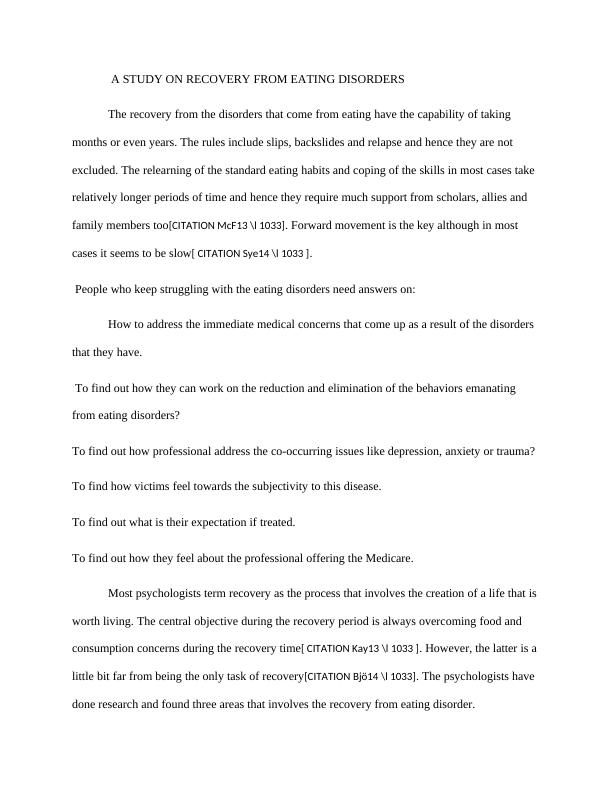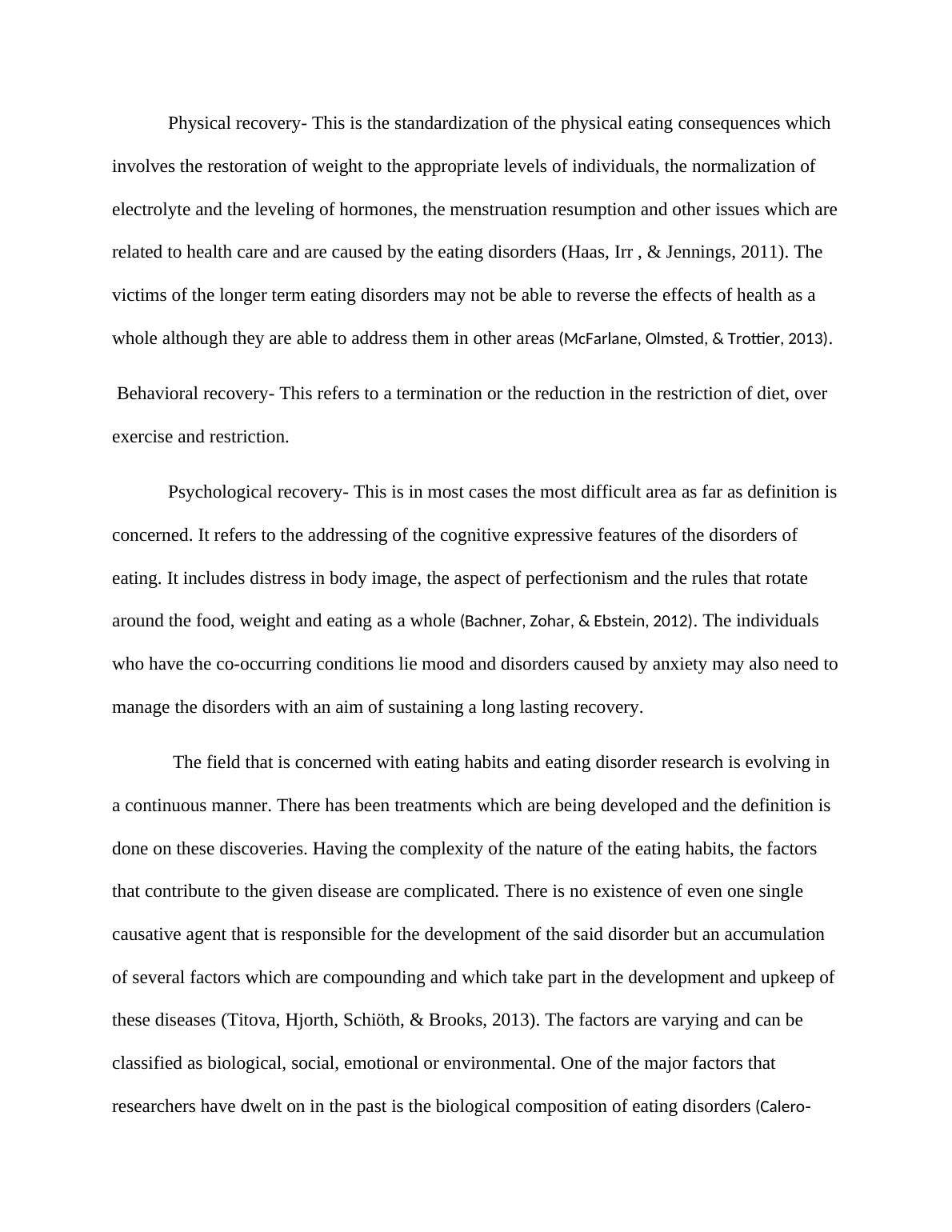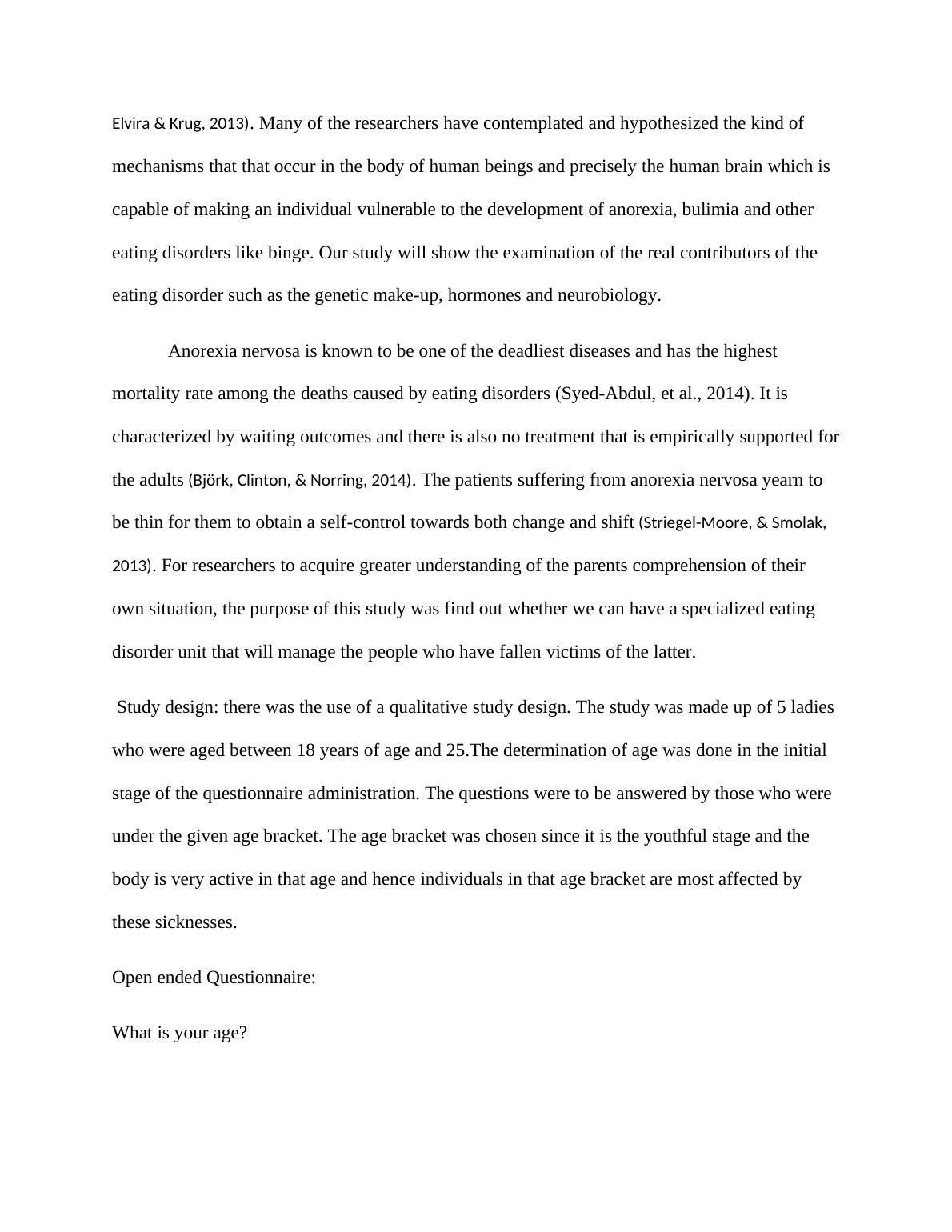Ask a question from expert
Study on Recovery from Eating Disorders
9 Pages2602 Words271 Views
Added on 2020-05-08
Study on Recovery from Eating Disorders
Added on 2020-05-08
BookmarkShareRelated Documents
A STUDY ON RECOVERY FROM EATING DISORDERSThe recovery from the disorders that come from eating have the capability of taking months or even years. The rules include slips, backslides and relapse and hence they are not excluded. The relearning of the standard eating habits and coping of the skills in most cases take relatively longer periods of time and hence they require much support from scholars, allies and family members too[CITATION McF13 \l 1033]. Forward movement is the key although in most cases it seems to be slow[ CITATION Sye14 \l 1033 ]. People who keep struggling with the eating disorders need answers on:How to address the immediate medical concerns that come up as a result of the disorders that they have. To find out how they can work on the reduction and elimination of the behaviors emanating from eating disorders?To find out how professional address the co-occurring issues like depression, anxiety or trauma?To find how victims feel towards the subjectivity to this disease.To find out what is their expectation if treated.To find out how they feel about the professional offering the Medicare.Most psychologists term recovery as the process that involves the creation of a life that is worth living. The central objective during the recovery period is always overcoming food and consumption concerns during the recovery time[ CITATION Kay13 \l 1033 ]. However, the latter is a little bit far from being the only task of recovery[CITATION Bjö14 \l 1033]. The psychologists have done research and found three areas that involves the recovery from eating disorder.

Physical recovery- This is the standardization of the physical eating consequences which involves the restoration of weight to the appropriate levels of individuals, the normalization of electrolyte and the leveling of hormones, the menstruation resumption and other issues which arerelated to health care and are caused by the eating disorders[ CITATION Haa11 \l 1033 ]. The victims of the longer term eating disorders may not be able to reverse the effects of health as a whole although they are able to address them in other areas[CITATION McF13 \l 1033]. Behavioral recovery- This refers to a termination or the reduction in the restriction of diet, over exercise and restriction. Psychological recovery- This is in most cases the most difficult area as far as definition isconcerned. It refers to the addressing of the cognitive expressive features of the disorders of eating. It includes distress in body image, the aspect of perfectionism and the rules that rotate around the food, weight and eating as a whole[CITATION Bac12 \l 1033]. The individuals who have the co-occurring conditions lie mood and disorders caused by anxiety may also need to manage the disorders with an aim of sustaining a long lasting recovery. The field that is concerned with eating habits and eating disorder research is evolving in a continuous manner. There has been treatments which are being developed and the definition is done on these discoveries. Having the complexity of the nature of the eating habits, the factors that contribute to the given disease are complicated. There is no existence of even one single causative agent that is responsible for the development of the said disorder but an accumulation of several factors which are compounding and which take part in the development and upkeep of these diseases[ CITATION Tit13 \l 1033 ]. The factors are varying and can be classified as biological, social, emotional or environmental. One of the major factors that researchers have dwelt on in the past is the biological composition of eating disorders[CITATION Cal13 \l 1033].

Many of the researchers have contemplated and hypothesized the kind of mechanisms that that occur in the body of human beings and precisely the human brain which is capable of making an individual vulnerable to the development of anorexia, bulimia and other eating disorders like binge. Our study will show the examination of the real contributors of the eating disorder such asthe genetic make-up, hormones and neurobiology.Anorexia nervosa is known to be one of the deadliest diseases and has the highest mortality rate among the deaths caused by eating disorders[ CITATION Sye14 \l 1033 ]. It is characterized by waiting outcomes and there is also no treatment that is empirically supported forthe adults[CITATION Bjö14 \l 1033]. The patients suffering from anorexia nervosa yearn to be thin for them to obtain a self-control towards both change and shift[CITATION Str13 \l 1033]. For researchers to acquire greater understanding of the parents comprehension of their own situation,the purpose of this study was find out whether we can have a specialized eating disorder unit thatwill manage the people who have fallen victims of the latter. Study design: there was the use of a qualitative study design. The study was made up of 5 ladies who were aged between 18 years of age and 25.The determination of age was done in the initial stage of the questionnaire administration. The questions were to be answered by those who were under the given age bracket. The age bracket was chosen since it is the youthful stage and the body is very active in that age and hence individuals in that age bracket are most affected by these sicknesses.Open ended Questionnaire:What is your age?

End of preview
Want to access all the pages? Upload your documents or become a member.